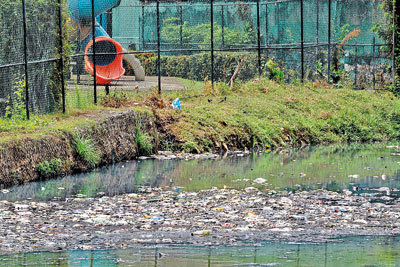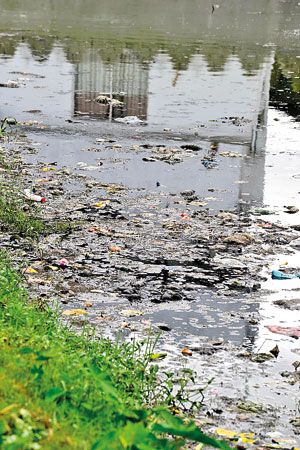News
Thousands of dengue patients trigger epidemic alarm
View(s):By Renishka Fernando
Dengue-infected Sri Lankans have now increased to 44,084 in the country and health officials fear an epidemic, with a sudden surge in cases this month.
Nimila Samarasinghe, 29, from Wellawatte, was diagnosed with dengue for the first time in his life. He had started to show symptoms of fever on July 11. As the fever did not subside, Mr Samarasinghe got an NS1 dengue antigen test done. It was then that he was diagnosed with dengue. 
“Until the fever subsided, it was hell,” he recalled.
Things took a turn for the worse when the infection developed into the dengue haemorrhagic fever stage.
He said the excellent monitoring and nursing by the staff at the Kalubowila Dengue High Dependency Unit ensured that he recovered.
Mr Samarasinghe suspects that the school he lives next to, which has been closed due to the fuel scarcity, is likely a mosquito breeding site. Health officials had visited the site after he was discharged from hospital on Monday evening and he had been asked to file a complaint.
He had also been informed that the municipal council should send a team to clean up and fumigate the area.
When dengue patients are reported from a particular area, the Ministry of Health (MOH) carries out an investigation. The area, the number of patients from the vicinity, etc are checked.

Ideal mosquito breeding ground: Debris on stagnant water (above, top). Pix by Eshan Fernando
An infection control nursing officer will submit the details of patients who are diagnosed with dengue to ‘Densys’, which is a surveillance system. In addition, health officers also visit the area and help to educate people on ways to control dengue.
Mosquito breeding sites are inspected and destroyed. Fumigation is done only if there is an outbreak as vectors become resistant if carried out early on.
But, field visits have been sharply reduced due to the fuel scarcity.
Dr Anoja Dheerasinghe, the consultant community physician from the National Dengue Control Unit (NDCU) advises people to be aware of locations where rainwater could collect.
“Everyone has a responsibility to keep their surroundings clean.”
According to data from the NDCU, 8,660 patients have been reported from July 1 to 21.
The districts of Colombo, Gampaha, Kalutara, Kandy, Kegalle, Galle, Ratnapura were highlighted as high-risk areas.
Due to the high prevalence of the virus, the MOH declared July 25 (Monday) a dengue prevention day as there is a risk of an outbreak.
All public and private institutions are being told to check their premises and identify and destroy mosquito breeding sites.
During the outbreak of 2017, guidelines on dengue control and prevention had been made and sent to all institutions across the country. These have been forwarded again along with reminders for implementation.
Establishments are required to clean their premises once a week.
Meanwhile, the MOH is also seeking help from non-governmental organisations.
A training programme will be held this Sunday, to raise awareness and educate people.
“This is a sustainable process for the future,” said Dr Dheerasinghe.
She said workplaces should have a health and safety officer who will monitor the environment and ensure there is no spread of dengue.
With schools scheduled to reopen Monday, she also recommends that schools be separated into various zones with persons in charge of them so they can certify that the environment is cleaned regularly and then report to the principal.
Sri Lankans are also being advised to use mosquito nets, mosquito coils, citronella oil and wear clothes that cover the body well.
But, the insecticides in mosquito coils, which vaporise as they burn, can be hazardous to human health.
The best way to say that you found the home of your dreams is by finding it on Hitad.lk. We have listings for apartments for sale or rent in Sri Lanka, no matter what locale you're looking for! Whether you live in Colombo, Galle, Kandy, Matara, Jaffna and more - we've got them all!

